
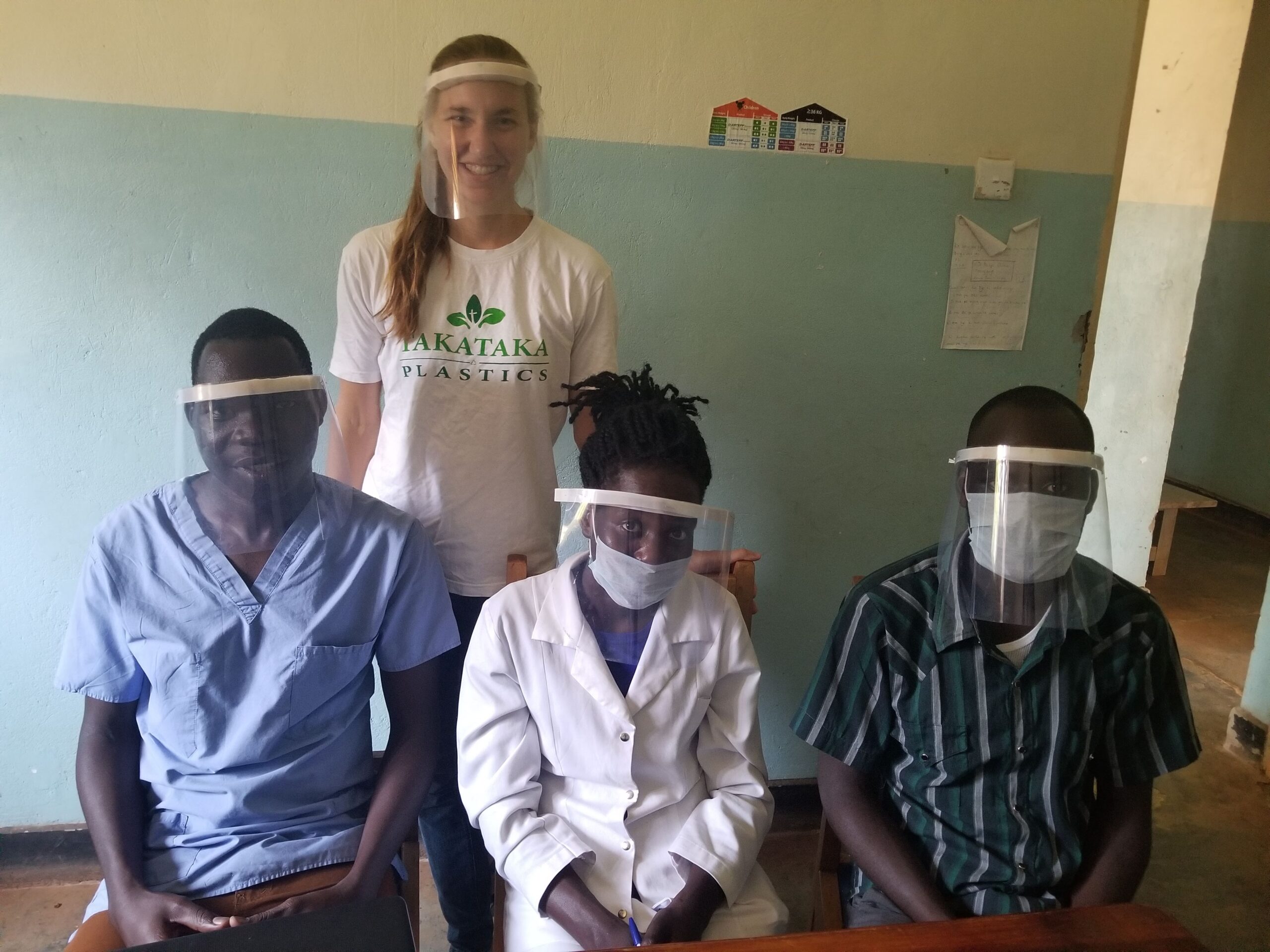
Insights from the Field: Cultural Sensitivity & Adapting to COVID-19
By: Paige Balcom, Rodman C. Rockefeller Centennial Fellow 2020; Cofounder and CTO of Takataka Plastics & UC Berkeley Mechanical and Development Engineering PhD Student
Mutual Understanding. Designing culturally and globally aware projects. These are complex challenges that the international development community has been trying to figure out for decades. Projects designed without these values in mind have caused all kinds of unintended consequences, pain, and harm. Forced projects that were not really needed or failed to address the underlying, core issues. Graveyards of equipment lying unused because people were not trained how to properly operate them or a simple gasket failed and the replacement could not be obtained in country.
I by no means have all the answers to creating culturally-sensitive projects, but I’m happy to share some insights I’ve learned from working in Uganda.
Be in the community
Before proposing a project, spend extended time in the community you’re working with. My first long-term experience in Uganda was living for nearly a year in a village where I was often the only mzungu (white person). Without having to worry too much about meeting project objectives, I got to really focus on learning the culture and experiencing what life is like for millions of Ugandans—their daily struggles and joys. I think it’s imperative for anyone interested in international development to spend at least 6 months living in a village. After fetching water every day, cooking over a charcoal stove, staying without power, and experiencing communal life, you’ll have a much more realistic perspective on projects.
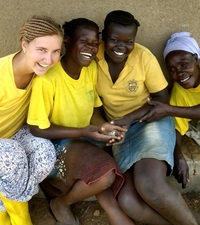
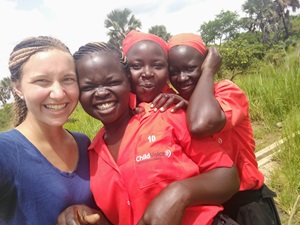
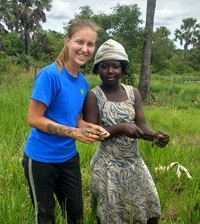
When you do have an idea for a project, talk to all kinds of people about it. Before starting Takataka Plastics, I interviewed over 200 people about their perspectives on plastic waste. I talked with villagers, women selling at markets, hardware shop owners, big contractors, district and national politicians, professors and students, local grassroots organizations working with plastic waste, and representatives from big multilateral organizations and aid agencies. Talking with all kinds of groups gave me a complete picture of the plastic waste situation in Uganda from which I could identify the unaddressed challenges. Some background reading is necessary, but most of this information can only be gathered on the ground. Then keeping in contact with people keeps me updated on new developments.
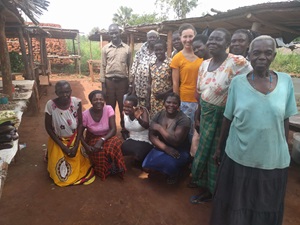
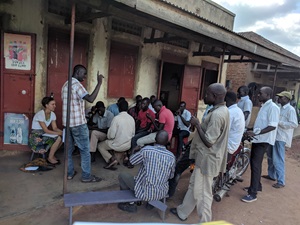
Rely on a strong local team
Find an honest, trustworthy, talented local partner with lots of connections in the community. Ideally, partner with someone from a local initiative with a similar vision. If they’ve already invested their own time and resources, you know they’re passionate and committed to your cause. There are many talented local people who often just lack resources to implement their ideas. Empower them with resources and watch what amazing things they will do.
You should bring a tangible skill to the project, but then trust your local team to know how best to implement the project in the community. For instance, I know engineering and some entrepreneurship and business models. Before I met Peter (my cofounder of Takataka Plastics), he had already founded a small organization in Gulu focusing on education around waste management. Together we formed Takataka Plastics and make a powerful team. I handle engineering and technology development, while he handles local operations and outreach.
Be patient
International development work takes a looooong time. There are inevitable delays (power goes off nearly every day for a week, the truck gets stuck in the mud, the guy with the keys to your store goes to attend a family burial in the village and his phone is off for 3 days, etc.). Many approvals are required: I can’t count the number of hours I’ve sat waiting in politicians’ offices waiting to present proposals or get my letters of introduction stamped.
It’s helpful to get feedback from local sources and from experts removed from the situation. It’s helpful to make rough plans, but situations change rapidly—new information comes from a new connection, laws change, harvests are poor, locusts invade, or corona virus disrupts—so don’t spend too much time planning and be ready to dynamically adapt.
It’s better to take your time instead of rushing and implementing decisions without gathering enough information or local support, so just accept that things happen slowly, don’t be frustrated by delays, and don’t cling too tightly to a plan.
Be wise
In any culture or situation, most people will be honest with you but some may try to take advantage of your lack of local knowledge or cultural understanding. Take your time, make inquiries, and double check with your local partners if you are unsure. In Ugandan culture, people rarely say “no” or that they can’t do something, they just give explanations and promise “tomorrow.” Be wise enough to know when the excuses are too many (like when they’ve attended 3 burials in two weeks) and when tomorrow is never coming. Rely on your local team for referrals, and when you find someone who delivers on time and fairly, try to always go to them first. In Uganda, there’s usually a mzungu price and a real price and bartering is often expected—using the local language helps a lot.
Also recognize that people often will tell you what they think you want to hear. They want your business or your help, so you may need to really push to get forthright feedback. Have your local team do the majority of the interviews in the local language and ask multiple times in different ways, “what did you not like? Why wouldn’t it work?”. It’s still important for you to get some first-hand information but realize that your presence will most likely affect responses.
Focus on relationships
American culture is very task-focused: you get your work done, even if you stay up all night or sacrifice personal commitments to finish. Ugandan and many other cultures are much more people-oriented: there’s lots of family responsibilities. Ugandans spend a lot of time staying in touch with friends and making new connections because jobs and business deals come mostly from who you know. So, when Ugandans spend a lot of time on what Americans would view as socializing or “not working”, they are working. You never know when at work, you’re going to need someone who knows where to find a microcontroller, or a guy who can deliver stones, etc. There’s no yellow pages or LinkedIn—work is done through who you know, so when someone who can deliver what you need is just a phone call away, all that time spent building your network pays off.
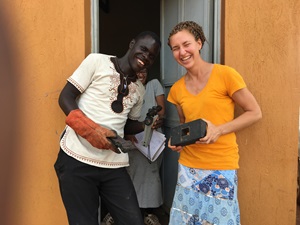
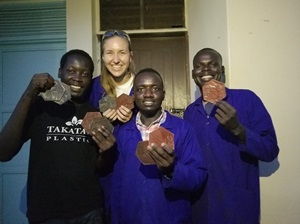
Learn to accept that fewer tasks will happen in a day, and spend time chit-chatting with colleagues, discussing the news with neighbors, and watching football with friends. You never know when such “non-work” interactions will inform your work, introduce you to new local initiatives and connections, and even spark new project ideas.
COVID-19
When Uganda announced its first cases of COVID-19, we asked ourselves what could Takataka Plastics do to help our community fight the pandemic?
Ugandan hospitals are woefully under-equipped—the country has 55 ICU beds for a population of nearly 43 million people. Thereis an acute lack of personal protective equipment (PPE) for medical staff. N95 respirators are unheard of. Surgical masks had run out in Gulu. Hardly any of the health facilities have face shields.
We heard about the lack of face shields from a friend (importance of network) and decided to try to make face shields from recycled plastic. We started experimenting and came up with a few prototypes. All the non-food shops are closed by the government lockdown, but we managed to get materials because we had relationships with hardware shop owners and machine suppliers. We simply called them, told them what we needed, and they delivered (again, importance of relationships). We took our prototype face shields to a clinic (managed by a doctor friend) and got valuable feedback from the doctor and his staff. Initially, the staff only gave positive feedback—they were really excited about the face shields! But when we probed deeper, they shared what they didn’t like about the prototypes, so that we could improve them. You can read more details and support face shields for Ugandan medics on our GoFund Me.
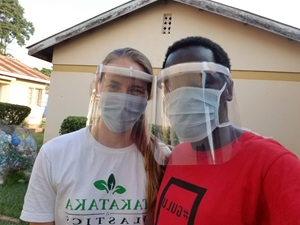
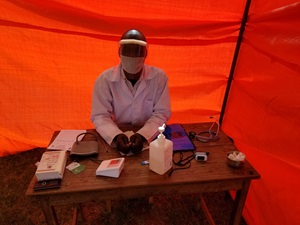
About a week before we heard about the need for face shields, I had to make the tough decision to leave or stay in Uganda. The borders were closing, lockdown restrictions were being strictly implemented by police, COVID-19 was expected to quickly spread across Uganda, and food insecurity was predicted to create social unrest. If I didn’t leave then, I probably wouldn’t be able to leave for a while. Many ex-pats and foreigners faced the same excruciatingly difficult decision. Everyone’s circumstances were unique, and many had to leave. But I’m thankful that my work and family situation allowed me to stay. Our local Takataka Plastics team is amazing, and they could have done the face shields project on their own, but initiating projects happens much faster and better when we can work together side by side. And staying earned me more respect and trust from colleagues and people around town I do business with. Spending more time in the community, especially when things are tough, strengthens relationships and the project.
I still don’t have all the answers to development projects, but relationships, patience, and staying in the community have helped Takataka Plastics do our part in fighting COVID-19 in Uganda.